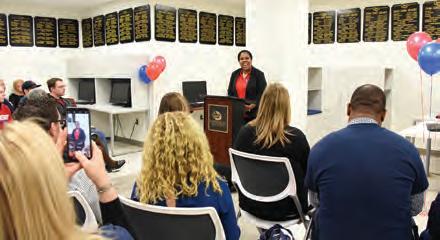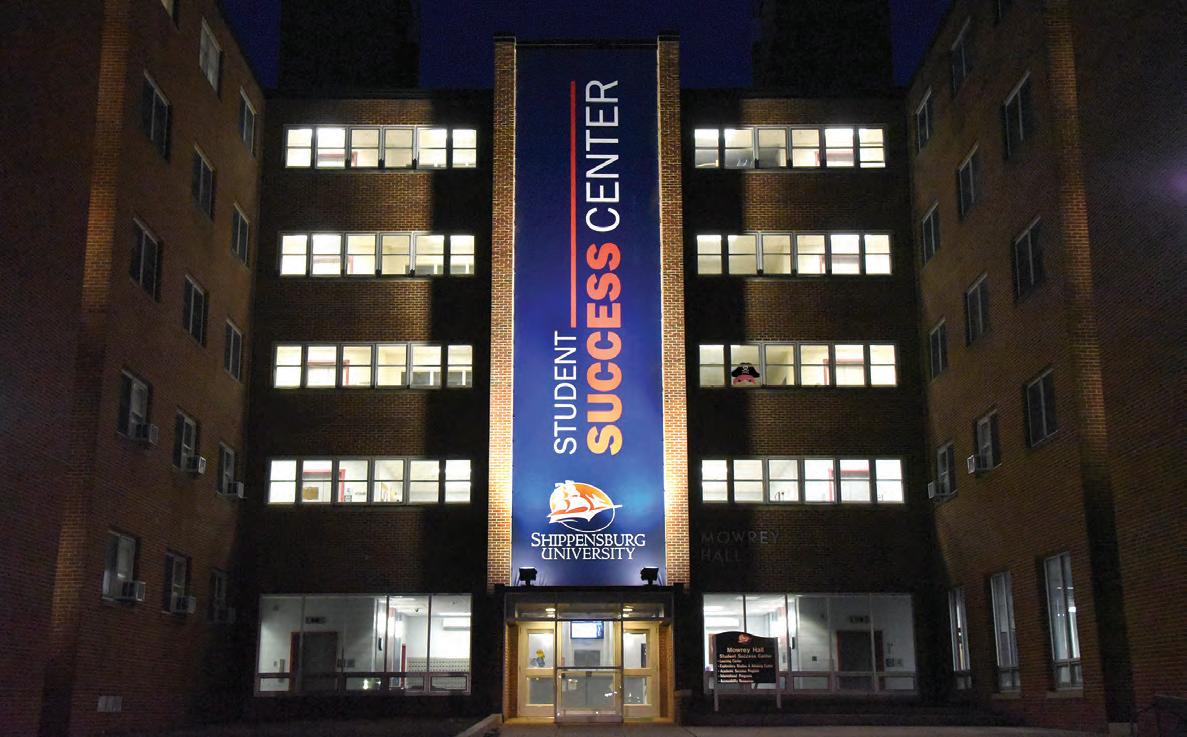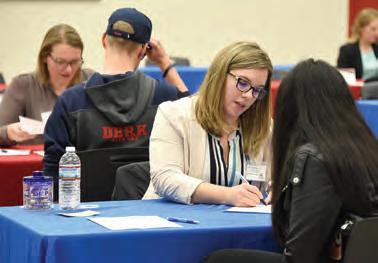
12 minute read
It Takes a Village
Preparing Students for Success
BY KATIE (PAXSON) HAMMAKER ’93
Each year, students from all walks of life come to Shippensburg University to begin or continue their college journey. Helping them succeed has always been a priority, but a recent initiative established by President Laurie A. Carter has inspired a new campus-wide approach to achieving this goal.
“Ship has always been there for the students, but there is a very intentional direction that we are headed in to ensure that we meet the needs of all of our students and their diverse backgrounds,” said Rochelle D. Plummer ’12, director of the new Office for Students First.
Realizing that each student’s needs are unique, Ship now offers a variety of new or redesigned services to support them. But, the focus extends beyond academic success. The campus is taking a more holistic approach to promote the emotional, mental, and overall well-being of students.
Addressing First-Gen Needs
Nearly 50 percent of the students in Ship’s incoming fall class are first-generation, or the first in their immediate family to attend college.
Recognizing the unique needs of this group, Ship opened the Office for Students First in January. Headed by Plummer, the center offers support and services specific to this population.
According to research, first-generation students may lack a general knowledge of the college process and struggle with basic academic jargon. While their parents can offer moral support, they cannot always provide the practical knowledge needed to navigate campus life.
Many first-gen students worry that they don’t belong at college. They also can experience anxiety and guilt about leaving home. According to Plummer, some firstgen students care for younger siblings or contribute to family income.
What’s more, first-gen students are less likely to seek assistance. Having been a first-generation student, Plummer remembers struggling with self-doubt and hesitating to ask questions in college.
Plummer said there is no single best way to help first-gen students. “It depends on the student, but it all goes back to being an active listener and letting them know that I care and that they matter.”
Relationship building is key, Plummer said. “Students are more likely to stay in college if they feel connected.”
Sometimes the relationship starts before college, as incoming students are encouraged to call or e-mail Plummer with questions in anticipation of classes. Once they arrive to campus, she reaches out to students who have voluntarily self-identified as first-generation.
“I can’t force a student to participate, but I try to entice them.” Her office is a judgment-free zone where students can ask questions, share their concerns, and request whatever support they need. Each student’s needs are unique. Some have general questions about academics, financial aid, and campus housing. Some make the transition to college with ease, but seek guidance building personal skills like time management, budgeting, or public speaking.
Other students need more from Plummer, especially in the way of emotional support. “Not all students have the moral support of their parents. Other students were part of the foster care system. Their primary contact may be a case worker.”
The average first-gen student is twenty-four years old, said Plummer. Some work part or full time, some have children, and they struggle to find a balance. Plummer works closely with campus staff and faculty to make accommodations for these students.
Tom Emond ’19 can relate. College was an eightyear process for the business management major. In addition to classes, Emond juggled full-time work and becoming a father while attending Ship.
“It was excruciatingly rough. There were so many demands for my attention and time.” His schedule frequently caused him to miss class and fall behind on his work. “But if I was honest and timely about what was going on, every single teacher was accommodating.”
Plummer admits that she does not have all the answers, but she will connect students to the right people and resources on campus.

Rochelle Plummer welcomes the Ship community to the newly dedicated Center for Emerging Scholars this spring.

Centralizing Student Success
Some of the answers can be found in the Elnetta G. Jones University Center for Student Success and Exploratory Studies.
The center is located in Mowrey Hall, the former dormitory. “The building was to be demolished, but President Carter had a vision,” said Denise Yarwood, associate vice president and dean of student success.
Mowrey was rededicated in 2018 with the purpose of housing multiple student enrichment services in one location. The services are not all new, but they are more accessible and centrally located.
Students can receive tutoring at the Learning Center, explore opportunities for international studies, and seek advisement on selecting a major.
Close to a third of new students enter college as “exploratory,” or without a declared major, according to Yarwood. “It’s a huge decision to make when you’re eighteen, and it’s okay that you don’t know what you want to do with your life. We’ll get you there.”
The center also houses the Early Alert System, now entering its fifth year. Faculty members who identify a struggling student can contact the coordinator for quick and confidential follow up.
“More often than not, the problem is not academic. Perhaps the student can’t afford a textbook or meals, or is having problems at home. There is no end of possible reasons. Our role is to find out why, and get the appropriate resources to help.”
To that end, the center added satellite offices for the campus registrar, admissions, and financial aid departments. “We can send students right down the hall for assistance,” Yarwood said.
The centralization of services has been beneficial for staff as well as students. “Now we’re under one roof, so we are more accessible to one another and can support each other in our work.”
Learning Different Writing Styles
Dr. Karen Johnson believes everyone can benefit from improving their writing.
Johnson, a certified reading specialist, serves as director of the Writing Studio, which is part of the Learning Center. She also is an associate professor in the Department of Academic Engagement and Exploratory Studies.
“But, the fellows help them with more than writing,” Johnson said. “It’s an opportunity to mentor them on other first-year college needs, such as housing, how the university works, and how to succeed in college.”
The Learning Center, located within the Student Success Center, always has provided writing tutoring, but created expanded and specialized writing support services in 2011.
“Writing tutoring is different, and tutors need specific training on how to teach it,” Johnson said.
The writing studio stresses more than just grammar and basic writing mechanics. Students are taught how to brainstorm, organize their thoughts, write a compelling thesis, and properly cite evidence to support the thesis. Writing support is provided by more than a dozen extensively trained fellows and student tutors.
Fellows are assigned to English 113 writing classes for first-year students who need extra writing support. In fact, support from the Writing Studio is an integrated part of the course. Fellows attend classes with the students and meet weekly with faculty to monitor each student’s progress and assess their ongoing needs.
The student fellows benefit as well, she said. “They develop para-professional skills for their own areas of study. Many of them are education majors, so tutoring is good experience.”
Fellow Sara Zook, a senior with dual majors in elementary and special education, credits her experience with building her comfort level in the classroom. “I absolutely fell in love with tutoring. I learned how to identify each student’s unique learning needs and how to differentiate the way I teach them.”
Student tutors provide general writing support for students campus wide. Under Johnson’s leadership, the Writing Studio offers specific writing support across multiple disciplines based on the department’s preferred writing style and needs.
Dr. Liz Fisher, chair of the Social Work and Gerontology Department, approached Johnson about several writing needs for her students. “I need students to be able to write succinctly and in a professional style,” Fisher said. “For example, writing case notes after facilitating a group session.”
Understanding academic writing is also important. “Social work is based in large part on research,” Fisher said. “Students must be able to read and comprehend research papers, then write about them.”
The Communication/Journalism Department requires students to pass a grammar efficiency exam. Previously, there was a 10 percent failure rate, and grammar issues resurfaced even after students passed the test. Using the exam results, Johnson developed specialized tutoring plans for students based on their grammar weaknesses.
The Writing Studio offers online tutoring, most helpful for commuters and students who live off campus. Students submit the draft writing assignment in advance, then video conference with a tutor for feedback.
The studio also supports graduate students. “Many graduate students are multi-lingual, and English is not their native language,” Johnson said. “Our tutors help them blossom in English.”
Ishaq Azzouni ’ 19m, credits the Writing Studio with helping him achieve a master’s degree in communication/journalism. The native of Saudi Arabia could fluently speak English, his second language, but struggled with the written word.
“My first semester was tough. I don’t remember who introduced me to the Writing Studio, but I am so thankful.”
Most students who receive tutoring show noticeable improvement in their writing skills, according to Johnson, who continually assesses the program. “But, it also improves their confidence,” she said. “They know that they can do college. And, they are more comfortable asking for help.”

Students worked with alumni and professionals to improve their resumes and prepare for their careers.
One Student at a Time
Dr. Elnetta Jones, in whose honor the Student Success Center was named, dedicated her life to making a difference in the world one student at a time.
A Ship alumna, Jones was an administrator at Ship for twenty-seven years. Throughout her career, she worked on behalf of students who needed extra assistance and encouragement to transition from high school to college, and to achieve academic success. She was a tireless advocate, and thousands of students benefited from her mentoring.
The Ship staff and faculty continue to use that approach today, helping one student at a time on his or her college journey. “If we can do one thing to help a student succeed, we have done good work,” Yarwood said.
A PROACTIVE APPROACH
On-campus students who miss class will hear from Alex Karlheim ’18m, coordinator of academic initiatives and student success.
In this newly-created position, Karlheim provides outreach and support to the more than 1,600 students who live in campus housing.
Ship’s staff always has supported campus residents, but now they are being more intentional and proactive about it. Karlheim wants students to adjust and thrive in campus life. One way she achieves this is by tracking class attendance for absenteeism and following up with the appropriate resident advisors.
The most common reason students missed class? They overslept. Sometimes illness is to blame. One student explained that her family pet died, so she spent a few days at home to grieve. Missed classes also could indicate that a student intends to drop the class.
Karlheim also monitors students during registration. Neglecting to register for the next semester’s courses could indicate that a student intends to drop out of college.
“Once we’ve identified the need, we’re very willing to direct or even accompany students to the right place on campus to get assistance,” she said. “If you’re sick, I can connect you to Etter Health Center. If you want to drop a class, I will make sure the student has talked to an advisor or knows about the Learning Center.”
Not all students are willing to ask for help, which makes intervention even more important, she said. “In the past, we just assumed that when students began college, they were ready. Some students are, but not all are. Or, they may be ready academically, but not emotionally.”
Resident advisors and residence hall directors play an important role. They are encouraged to interact with students, and form a genuine relationship with them while respecting professional boundaries.
“We don’t want students to think of the RA as someone who can get them in trouble, but as someone who can be a helpful resource,” Karlheim said.
In all, Ship staff completed 3,200 interactions with students during the 2018- 19 school year.
ENLISTING THE ALUMNI COMMUNITY
Nearly 70,000 Ship alumni have a tremendous wealth of knowledge and experience to share with today’s students.
Lorie Davis ’98m, executive director of the Career, Mentoring, and Professional Development Center, had this in mind when she created the new Raiders Connect 365 Mentoring Program.
“Our alumni love to give back,” she said. “I knew that they wanted to help, and I knew a lot of them to reach out to.” Davis previously served as the director of alumni career services and outreach for over a decade.
Through the program, Ship students are matched with alumni based on career interest and geographic location.
“Our alumni can offer industry-specific advice, as well as networking opportunities. The Career Development Center staff can’t be experts in all fields, but we can connect them with professionals who are.”
Davis explained that the mentor program was designed to build a long-term, meaningful relationship between mentors and students. “This is not just a one-time conversation, but a year-long commitment.
Mentors and mentees are required to communicate at least four times a year, although they are encouraged to talk more often. Davis encourages face-to-face meetings, but students can also communicate by phone or Skype.
To date, the Career Center has forty mentor/mentee matches. Davis has received very positive feedback from participants.
Junior Kensy Philippe hopes to pursue a career in medicine, and gained valuable knowledge through a mentor experience with Dr. Luke Perry ’14, a medical resident with the Inspira Health Network.
“Working with Dr. Perry helped me understand the medical field a lot more,” Philippe said. “That allows me to have a big smile on my face when I think about my future.”
Perry said he chose to become a mentor because he understood firsthand the challenges of medical school and the application process. “When I was in my mentee’s shoes, I would have appreciated someone sharing knowledge and insight into the future and giving me constructive criticism, as well as the pros and cons about the path that I wanted to take.”
In addition to career exploration, mentees can build connections for their future success. According to industry statistics, more than 70 percent of professionals find employment through networking.
To Become a Career Mentor
Contact Lorie Davis at (717) 477-1484 or ladavis@ship.edu. Or, visit ship.edu/career, and download the Mentor Application Form.



